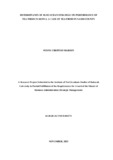DETERMINANTS OF BLUE OCEAN STRATEGY ON PERFORMANCE OF TEA FIRMS IN KENYA: A CASE OF TEA FIRMS IN NANDI COUNTY
Abstract
Blue ocean concept plays a critical role in strategic management in organization especially in tea industry which has led to tremendous growth over the past years. It is in regard to this strategic focus that this study sought to establish the determinants of Blue Ocean strategy on performance of Tea firms in Kenya, a case of Nandi County tea firms. The study specifically sought to; establish the effect of increase factors on the performance of tea firms in Kenya, assess the effect of reduce factors on performance of tea firms in Kenya, determine the effect of create factors on performance of tea firms in Kenya and evaluate the effect of eliminate factors on performance of tea firms in Kenya. The study was guided by Beach Theory, Resource-Based Theory and Value Innovation Theory. The study adopted a case study research design. The study population comprised a total of 99 top management staff from tea firms in Nandi County. The study used non-probability sampling design by applying a purposive sampling technique. Questionnaires were used as the primary data collection instrument and they were self-administered to the respondents. A pilot study was undertaken in Mbogo Valley Tea Factory in Nandi County, to test the validity and reliability of the questionnaires. The content validity of the instruments was examined by the experts and their suggestions used to improve the tool before they were used to collect data. The reliability of the instruments was subjected to Cronbach Alpha method. The data collected was analyzed using both descriptive and inferential statistics. Multiple regression model was used to determine the association between independent variables and dependent variable. The findings were presented using tables and graphs. The study is significant to management and shareholders of tea firms, policy makers and regulators and scholars since it contributes to the existing knowledge on the determinants of blue ocean strategy on performance of tea firms in Kenya, a case of Nandi County tea firms. The study found that increase factors was statistically significant to performance of tea firms (β1=0.888, p=0.000, p<0.05), reduce factors also had statistical significance on the performance of tea firm (β2=0.010, p=0.000, p<0.05). The study concluded that create factors had statistical effect on performance of tea firms (β3=-0.078, p=000, p<0.05) while eliminate factors had no statistical effect on the performance of tea firms (β4=0.030, p=0.790, p>0.05). The study further concluded that increase factors, reduce factors, create factors and eliminate factors combined are statistically significant in explaining performance of tea firms in Kenya. The study concluded that the major determinants of blue ocean strategy on performance of tea firms were increase factors, reduce factors, create factors and eliminate factors. The study recommendations were; to increase the factory door sales to local markets which will increase the domestic consumption; to reduce on the production costs tea firms should venture in joint hydro-electric power plants to supplement electricity needs as well as establish own tree plantation to keep a steady supply of wood fuel; eliminate mismanagement of tea factories by putting in place proper policies and strict procedures that help factories to gap any malpractices on mismanagement of factories. Introducing electronic weighing machinery to reduce farmers’ leaf loss by giving accurate data as well as prevent the theft of the Greenleaf by those collecting the product from the field.

